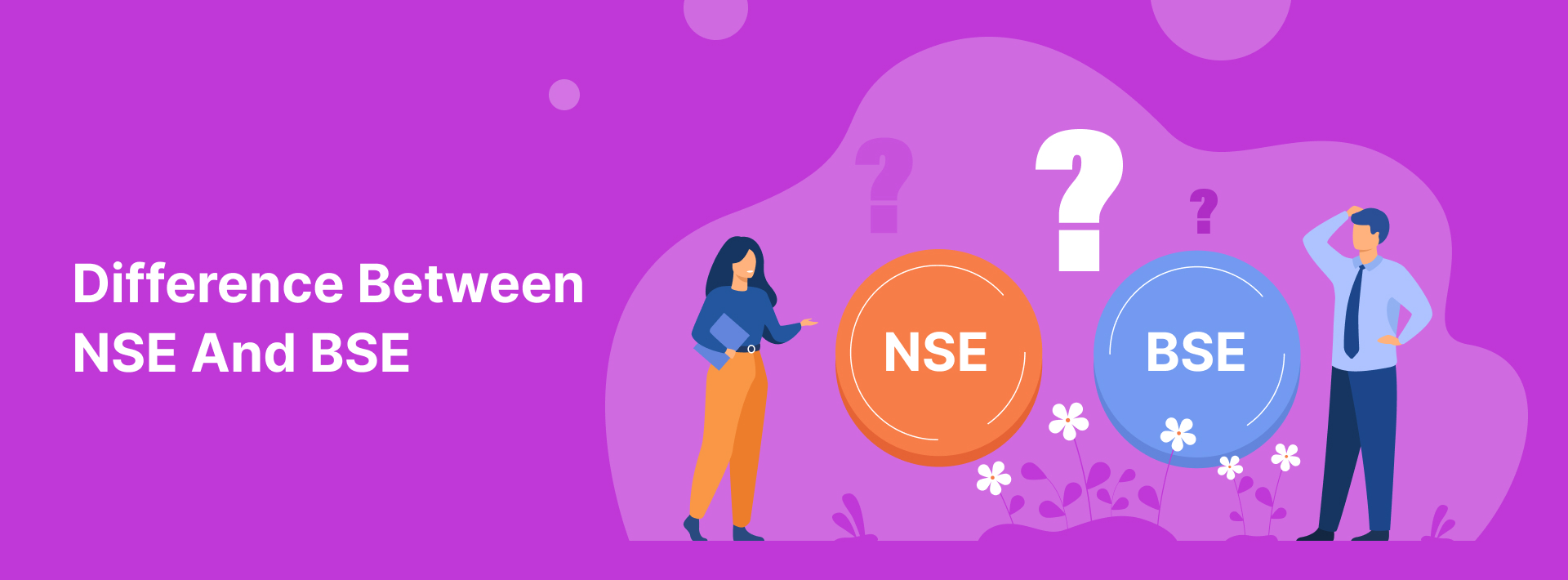Difference between NSE and BSE
A stock exchange is a place where traders and brokers can buy and sell securities, shares, bonds, stocks or other financial instruments, and is one of the most important components of the stock market.
The National Stock Exchange (NSE) and the Bombay Stock Exchange (BSE) are the two main stock exchanges in India. These are also among the largest stock exchanges in Asia and BSE is also one of the oldest stock exchanges in Asia.
The Bombay Stock Exchange or BSE
The Bombay Stock Exchange was established in 1875 under an official organization called The Native Share and Stock Brokers Organization. The BSE is currently the ninth largest stock exchange in the world with a market capitalization of USD 3.6 trillion as of January 2022. It is the tenth oldest stock exchange in the world and the oldest in Asia. It is the first stock exchange in the country to be recognized by the Government of India. BSE moved to an electronic platform in 1995 and is considered to be the fastest exchange in the world today with its online trading platform called the BSE On-Line Trading or BOLT. The Index of BSE is popularly known as the BSE SENSEX. In 2016 BSE established India INX, the first international exchange of India.
The National Stock Exchange or NSE
The National Stock Exchange was incorporated in 1992 with the vision of bringing transparency into the Indian equity market. NSE brought trading to the masses by allowing anyone who met the minimum financial requirements, experience and qualification to trade at NSE. It was recognized by SEBI as a stock exchange in April of 1993 and commenced its operations in June of 1994. NSE was the first dematerialized exchange in India and offered remote trading facility across the Country. NSE was also instrumental in creating the National Securities Depository Limited (NSDL) that allows investors to electronically transfer and store all their financial instruments.Over the years the NSE has made some significant achievements. It is the 10th largest stock exchange in the world as of August of 2021 with a market capitalization of about USD 3.4 trillion. It is the first exchange in India to launch global indices in S&P 500 and the Dow Jones Industrial Average. The index of NSE is called NIFTY.
Difference Between NSE and BSE
The major differences between NSE and BSE are listed below
| NSE | BSE |
| Established in 1992 and started operations in 1994. Recognized as stock exchange in 1993 | Established in 1875. It is the 10th oldest stock exchange in the world and oldest in Asia. Recognized as a stock exchange in 1957 |
| 10th largest in global stock exchange ranking with market cap of $ 3.4 trillion | 9th largest in global stock exchange ranking with market cap of $ 3.6 trillion |
| NSE started as an electronic stock exchange promoting paperless trading | Originally an open outcry floor trading exchange, BSE became paperless in 1995 |
| NSE has listed more than 1600 companies under it | BSE has more than 5000 companies listed under it |
| NSE has a larger volume of trading and higher liquidity | Lower liquidity compared to NSE |
| NIFTY, also called NIFTY 50, is the stock index of NSE and tracks top 50 stocks. Other indices of NSE are NIFTY Next 50 and NIFTY 500 | SENSEX, the stock index of BSE tracks top 30 stocks. Other indices of BSE are S&P BSE SmallCap, S&P BSE MidCap, S&P BSE LargeCap, and BSE 500 |
| NSE promotes equity, equity derivatives, commodity derivative, currency derivative, and debts trading | BSE promotes equity, debt instruments, mutual funds, and currencies |
| NSE is planning an IPO | BSE launched IPO in May 2017 and is listed at NSE |
| NSE’s international exchange is awaiting SEBI approval | BSE has an international exchange, India INX, the first international exchange of India |
| NSE has 10 group companies | BSE has seven group companies |
| Mr.AshishChauhan is the MD & CEO | Mr.VikramLimaye is the MD & CEO |
Points of Note:
- An investor/trader can buy in BSE and sell in NSE or vice versa. All you need is a DEMAT account and a DP. But this form of trading comes with its own risks that the investor should be aware of.
- Both NSE and BSE are stock exchanges where you can trade. NSE has a higher liquidity which is considered better for day trading, but BSE has a larger number of companies listed. An investor can choose the exchanges based on their needs.

